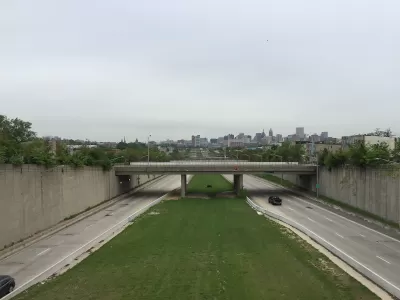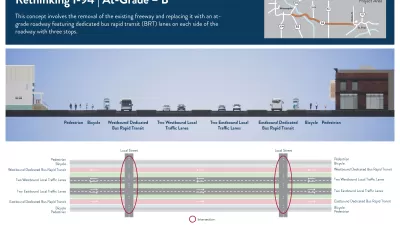The first $185 million in grants were awarded to projects that aim to improve mobility and reconnect neighborhoods isolated by highways and other infrastructure projects.

The U.S. Department of Transportation has announced 45 recipients of grants totaling $185 million under the Reconnecting Communities Pilot Program, funded via the Infrastructure Investment and Jobs Act (IIJA).
The program “provides technical assistance and funding for communities’ planning and construction projects that aim to connect neighborhoods back together by removing, retrofitting, or mitigating transportation barriers such as highways and railroad tracks.”
According to a press release from USDOT, “This first round of grants will fund construction and planning for transformative community-led solutions, including capping interstates with parks, filling in sunken highways to reclaim the land for housing, converting inhospitable transportation facilities to tree-lined Complete Streets, and creating new crossings through public transportation, bridges, tunnels and trails.” Some of the awarded projects include a highway cap and tunnel in Buffalo, New York; a freeway redesign in Long Beach, California; and planning for the redesign or removal of Baltimore’s infamous, never-completed ‘Highway to Nowhere.’
Some recent articles warn that Reconnecting Communities dollars could end up funding road expansion projects and perpetuating car-centric planning.
The press release states that “President Biden’s Inflation Reduction Act also established a new, $3 billion program called the Neighborhood Access and Equity Grant Program which can also fund projects that reconnect communities. DOT anticipates launching this program later this Spring.”
FULL STORY: Biden-Harris Administration Announces First-Ever Awards from Program to Reconnect Communities

Maui's Vacation Rental Debate Turns Ugly
Verbal attacks, misinformation campaigns and fistfights plague a high-stakes debate to convert thousands of vacation rentals into long-term housing.

Planetizen Federal Action Tracker
A weekly monitor of how Trump’s orders and actions are impacting planners and planning in America.

In Urban Planning, AI Prompting Could be the New Design Thinking
Creativity has long been key to great urban design. What if we see AI as our new creative partner?

California Creates Housing-Focused Agency
Previously, the state’s housing and homelessness programs fell under a grabbag department that also regulates the alcohol industry, car mechanics, and horse racing.

Chicago’s Ghost Rails
Just beneath the surface of the modern city lie the remnants of its expansive early 20th-century streetcar system.

Baker Creek Pavilion: Blending Nature and Architecture in Knoxville
Knoxville’s urban wilderness planning initiative unveils the "Baker Creek Pavilion" to increase the city's access to green spaces.
Urban Design for Planners 1: Software Tools
This six-course series explores essential urban design concepts using open source software and equips planners with the tools they need to participate fully in the urban design process.
Planning for Universal Design
Learn the tools for implementing Universal Design in planning regulations.
planning NEXT
Appalachian Highlands Housing Partners
Mpact (founded as Rail~Volution)
City of Camden Redevelopment Agency
City of Astoria
City of Portland
City of Laramie





























